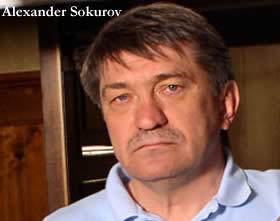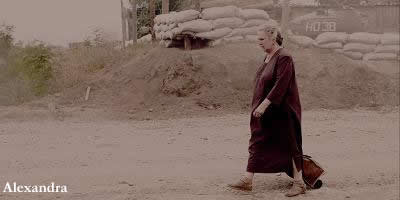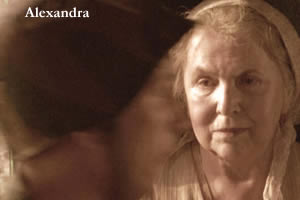 Will Russian filmmaker and opera director Alexander Sokurov follow in the footsteps of Bruce Beresford, Billy Friedkin and Garry Marshall to direct opera in Los Angeles? While on a rare visit to Los Angeles for a special screening of his newest film “Alexandra” (which competed at this year’s Cannes festival), the visionary filmmaker, best known to American audiences for his one-take 2002 feature “Russian Ark,” told Cinema Without Borders he’d “love to direct an opera here” but has yet to be approached with an offer. He was responding to rumors in the music community that he might indeed be on the short list of L.A. Opera general director Placido Domingo for an upcoming assignment, much as the maestro has invited Woody Allen to direct a production next September of Puccini’s one-act opera “Gianni Schicchi.” No public word yet from Domingo’s people.
Will Russian filmmaker and opera director Alexander Sokurov follow in the footsteps of Bruce Beresford, Billy Friedkin and Garry Marshall to direct opera in Los Angeles? While on a rare visit to Los Angeles for a special screening of his newest film “Alexandra” (which competed at this year’s Cannes festival), the visionary filmmaker, best known to American audiences for his one-take 2002 feature “Russian Ark,” told Cinema Without Borders he’d “love to direct an opera here” but has yet to be approached with an offer. He was responding to rumors in the music community that he might indeed be on the short list of L.A. Opera general director Placido Domingo for an upcoming assignment, much as the maestro has invited Woody Allen to direct a production next September of Puccini’s one-act opera “Gianni Schicchi.” No public word yet from Domingo’s people.
But the organizers of Sunday’s screening, lead by veteran publicist Lee Solters and his staff with assistance from musician Inna Gotman, had invited Domingo to the event in the obvious hope the two might meet and make great music together in the future. A fan of Sokurov’s many opera productions in Russia and Europe, Domingo was otherwise engaged and couldn’t attend. But music was still a dominant theme of the night thanks to film’s lead performance by the legendary Russian opera soprano Galina Vishnevskaya, widow of the late great cellist Mstislav Rostropovich.
musician Inna Gotman, had invited Domingo to the event in the obvious hope the two might meet and make great music together in the future. A fan of Sokurov’s many opera productions in Russia and Europe, Domingo was otherwise engaged and couldn’t attend. But music was still a dominant theme of the night thanks to film’s lead performance by the legendary Russian opera soprano Galina Vishnevskaya, widow of the late great cellist Mstislav Rostropovich.
Vishnevskaya makes her film debut at the tender age of 81 in a starkly solemn role of an ailing woman visiting her  grandson in a Russian army camp during the Second Chechnyan civil war. (Sokurov filmed on location in Chechnya, through the film shuns any images of corpses or shooting or violence). In a muted, almost languid performance that betrays not a hint of her great operatic other-life as the past star of the Met’s Aida and La Scala’s Turandot, Russia’s long-retired diva trundles across the film’s dusty desert topography, and through its army tents and tanks crowded with half-naked and sweating soldiers, in nothing more than a dowdy cotton house dress. De-glamorization has never seemed so glaring, and daring, in recent cinema.
grandson in a Russian army camp during the Second Chechnyan civil war. (Sokurov filmed on location in Chechnya, through the film shuns any images of corpses or shooting or violence). In a muted, almost languid performance that betrays not a hint of her great operatic other-life as the past star of the Met’s Aida and La Scala’s Turandot, Russia’s long-retired diva trundles across the film’s dusty desert topography, and through its army tents and tanks crowded with half-naked and sweating soldiers, in nothing more than a dowdy cotton house dress. De-glamorization has never seemed so glaring, and daring, in recent cinema.
Those wanting a bit more glamor could find it at the after-screening buffet and concert at the Regency Club across the street, thrown to help massage Hollywood Foreign Press voters to nominate “Alexandra” for a Golden Globe in the best foreign language film category. (In the foreign-language film Oscar race, Russia snubbed “Alexandra” and nominated Nikita Mikhalkov’s drama “12” instead. It’s a modern adaptation of Sidney Lumet’s 1957 court drama Twelve Angry Men that also features a Chechen theme: 12 jurors must decide the fate of a Chechen teenager charged with patricide). As guests waited in line for their portions of wild salmon accompanied by caviar brioches and chilled vodka (not frozen – very un-Russian, that), their faces wore that same somber look as the movie’s boy-soldiers waiting to grease up their guns for war. Perhaps it was the residue of Sokurov’s film, or the majesty of Vishnevskaya’s voice over the sound system that put them in the mood. Or maybe it was the live strains of the rising young tenor Timur Bekbosounov singing Russian songs. Whatever the reason, the night felt musically and spiritually all of a piece, missing only the sounds of Rostropovich’s cello to burnish the mood. “Music is such a huge part of my life, and Vishnevskaya is such a huge part of Russian music” noted Sokurov, who directed the singer in the 2006 documentary about her late husband, Elegy of a life: Rostropovich. “So this film is an homage to her life as well.”
“Alexandra” and nominated Nikita Mikhalkov’s drama “12” instead. It’s a modern adaptation of Sidney Lumet’s 1957 court drama Twelve Angry Men that also features a Chechen theme: 12 jurors must decide the fate of a Chechen teenager charged with patricide). As guests waited in line for their portions of wild salmon accompanied by caviar brioches and chilled vodka (not frozen – very un-Russian, that), their faces wore that same somber look as the movie’s boy-soldiers waiting to grease up their guns for war. Perhaps it was the residue of Sokurov’s film, or the majesty of Vishnevskaya’s voice over the sound system that put them in the mood. Or maybe it was the live strains of the rising young tenor Timur Bekbosounov singing Russian songs. Whatever the reason, the night felt musically and spiritually all of a piece, missing only the sounds of Rostropovich’s cello to burnish the mood. “Music is such a huge part of my life, and Vishnevskaya is such a huge part of Russian music” noted Sokurov, who directed the singer in the 2006 documentary about her late husband, Elegy of a life: Rostropovich. “So this film is an homage to her life as well.”
Alexander Sokurov addressing the audience at Los Angeles screening of Alexandra:

